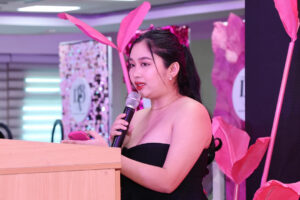L’OREAL’s Digital Beauty Academy program has produced 516 graduates, all aiming to earn their livelihood through social media.
With the rise of social media content monetization, this new iteration of L’Oreal’s Beauty for a Better Life program (which usually produces skilled beauty professionals) equips the students with knowledge on beauty, digital marketing strategies, e-commerce essentials, and expert social media management. The second batch of graduates were honored in a ceremony at Quezon City Hall on Jan. 16.
“We needed to create a program that would allow us to reach more individuals. What better way to do it than to use the power of beauty… and use digital to create more opportunities for individuals?,” said Krhizzy Pasigan, Corporate Affairs Head of L’Oreal Philippines in a press conference after the event. “At L’Oréal, we are moved by the impact that the Digital Beauty Academy training has had on its graduates. Guided by Beauty for a Better Life principles, we believe that beauty and education can be catalysts for social inclusion, providing women self-confidence and empowerment. In today’s digital landscape, we aim to go beyond traditional boundaries and utilize beauty and digital to unlock new livelihood opportunities in social commerce and content creation,” said Yannick Raynaud, Managing Director of L’Oréal Philippines in a statement. “We look forward to further expanding programs like this to other beneficiaries and cities around the country.”
The program was enabled with the cooperation of SPARK! Philippines, TikTok, and the Quezon City government, from where the graduates hailed from.
With previous iterations of the Beauty for a Better Life program, success could be measured with the immediate employment of the graduates. With the Digital Beauty Academy, and the rollercoaster ride of social media success, outcomes might be more nebulous. Still, at least according to Angelica Galang, a graduate from the first batch, life has improved.
Speaking in the same press conference, Ms. Galang said that she had been shy at first, but after training under the Digital Beauty Academy, she gained confidence, 48,000 followers, and a six-digit income.
“I think more than economic empowerment, my personal perspective is that when we had the launch of the first cohort, you can see that everybody was quiet,” said SPARK! Philippines Executive Director Maica Teves. “I think part of this is women finding their own voice.”
Observing that most of the participants in the program were women or LGBTQIA+ individuals, Quezon City Mayor Josefina “Joy” Belmonte emphasized the importance of granting economic opportunities to these particular groups. Ms. Belmonte gave other examples of gender-based economic programs that Quezon City has for its citizens, including the No Woman Left Behind project which helps women in jails by providing them with training and skills to convert tarps into bags, sold in retail stores and other channels. A percentage of these proceeds is given back to the women, because as Ms. Belmonte points out, “In the country, even when they’re in jail, they’re still the breadwinners in the family. They use this income to help their families.”
“There is solid data to show that when there are equal opportunities for everyone, there is greater progress in a society. Equal opportunities means that everybody is able to have equal chances towards progress, equal choices to develop their potential, and to contribute to the betterment of the nation,” she said during the press conference. — JLG
